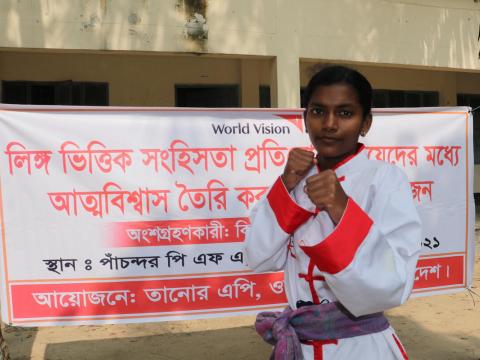The Karate girls protecting themselves from violence

“I am confident. I dare to go to school and return from school alone,” says 14-year-old Rifa.
Rifa has completed six months of martial art courses with the support of World Vision Bangladesh.
Like Rifa, many girls face difficulties while walking alone. Teasing and backbiting is common in Bangladesh.
World Vision Bangladesh launched the Shahosh (courage) initiative in 2019. Shahosh teaches girls to defend themselves from gender-based violence including rape and sexual abuse, forced prostitution, child marriage, dowry-related violence, sex trafficking, and forced labour.

Initially, Rifa’s parents were hesitant to send her to martial art classes. She would have to practice in front of other people. The initiative was also challenging gender stereotypes prevalent in her village.
But thanks to her school’s head mistress, who – with World Vision’s support - raised awareness among the community to break the chain of negative thinking, Rifa’s parents agreed she could take part.
"Now my parents do not feel insecure when I am out of the house,” Rifa tells us.
“The villagers respect us when we go to the martial arts class wearing our uniform. Also, the local government supports us in fighting against gender-based violence.”

Martial arts helped me to grow strong and build my confidence. I have learnt of effects of child marriage, child labour and gender-based violence from the six-month course.
Rifa wants to be a police officer in future. She wants to help end violence against children, especially violence against girls.
Director of Integrated Thematic Solutions of World Vision Bangladesh, Buli Hagidok, adds, "It is about changing the perception of society. Girls are not weak; girls also can protest and protect themselves; if opportunities are available.”

Like Rifa, a total of 145 girls aged 11-16 years old from remote villages were given a six-month self-defence training course under the Shahosh initiative by World Vision in Bangladesh.